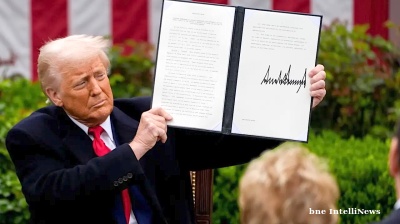The president of the Moldovan separatist republic of Transnistria, Evgheni Shevchuk, has endorsed by presidential decree the result of the 2006 referendum in which 97% of the population opted for independence followed by unification with Russia.
Shevchuk’s move comes in advance of Transnistria’s presidential elections December. It has been criticised by Chisinau, which says the decree undermines the efforts carried by the authorities in Moldova and the international partners involved in the 5+2 negotiations aimed at identifying a viable solution to the problems in Transnistria while observing the integrity of the sovereign state of Moldova.
The decree stipulates, as a first step, the adjustment of the region’s legal system in line with Russia’s laws.
Transnistria, a thin strip of land between the Dniester river and Moldova’s border with Ukraine, does not share a border with Russia. It has been de facto independent since the early 1990s but is not internationally recognised.
Shevchuk’s announcement received a moderate response from the Moldovan authorities. The decree is void because it is issued by an institution that breaches Moldova’s constitution and is the result of an illegal referendum carried within a part of Moldova, according to a statement from the government’s bureau for reintegration.
Moldova’s government has called on its international partners to state their positions on the decree and to avoid further deterioration in the negotiation process and the emergence of new tensions in this part of Europe.
“The decree signed by the Tiraspol leader [Shevchuk] is a populist action, in the context of the so-called elections organised in the separatist region,” Moldova’s Prime Minister Pavel Filip commented quoted by noi.md.
The move was made in the context of the presidential elections in Transnistria. Shevchuk will run in the presidential election on December 11, after the informal political group supporting him lost the parliamentary elections last autumn. The opposition, which holds a majority in the parliament but has limited power due to the presidential regime in Transnistria, is threatening legal action against Shevchuk related to frauds he allegedly engaged in.
Under the political system in the unrecognised republic, the president appoints the prime minister and supervises the activity of the government. The opposition party Obnovlenie, which is the political arm of the dominant economic group in the region, Sheriff, has been putting pressure on Shevchuk including through its investigations related to the president’s alleged involvement in siphoning off public money.
Sheriff has typically backed the winner in the presidential elections, including Shevchuk in the past, and this time Obnovlenie has nominated parliament speaker head Vadim Krasnoselski for the December 11 elections.
Transnistrian prosecutors have not so far taken any action against Shevchuk. However, in June Russian officials accused Shevchuk of siphoning off Russian aid, an allegation he denies.
Aid to the Moldovan enclave has allegedly been siphoned off to offshore companies through gas and power trader Energokapital, according to Alexander Harichkov, head of a Russian investigation committee supervising important matters related to the pro-Russian separatist republic, quoted by media centre Rosbalt-Moscow.
The investigations into possible frauds related to Russian aid were prompted by a notification filed by Transnistria’s deputy parliament speaker Galina Antyufeeva, Harichkov explained. Earlier this year, Antyufeeva, a member of Obnovlenie, accused Shevchuk of fraud worth $100mn, including siphoning off aid provided by Russia.
Shevchuk has hit back, accusing Sheriff, Moldova’s largest holding company, of tax evasion. Sheriff abused the preferential import regime extended by former President Igor Smirnov between the start of the regime in 2006 and 2011, the customs authority of Transnistria concluded in a report quoted by Moldova’s infotag.md news agency on July 1.
This helped Sheriff gain a monopolistic position on the consumer goods markets in the separatist republic and furthermore to re-export some of its products to Moldova, Ukraine, Russia and European Union markets. The unfair competition has ruined local producers, the report concludes.
The authorities in Transnistria accused Sheriff last November of having siphoned money out of the country under a scheme largely resembling transfer pricing.
News

European foreign ministers hit out at Georgian ruling party
Statement condemned ongoing democratic backsliding by the ruling Georgia Dream party, which has consolidated power via crackdowns on independent media, NGOs, activists and opposition politicians.
_1752493253.jpg)
RSF urges EU action over police violence against journalists in Serbia
Press freedom watchdog Reporters Without Borders warned abuses threaten the country’s EU accession process.

US and Panama launch joint military exercises amid canal security concerns
US helicopters have arrived in Panama to begin collaborative training exercises with local security forces, as tensions mount over the strategic waterway's future amid competing US and Chinese interests.

Migration pushes EU population to record high, but CEE countries continue to shrink
Immigration outweighed the natural population decline in 2024 in just three of the newer EU member states – Croatia, Czechia and Slovenia.



